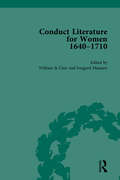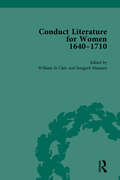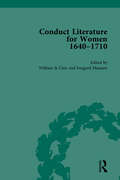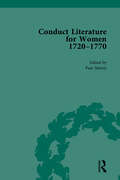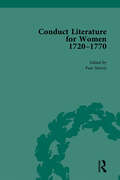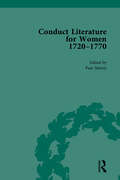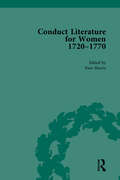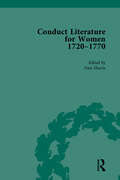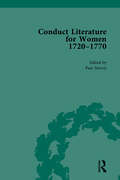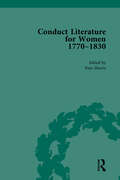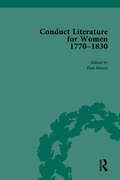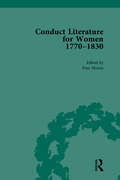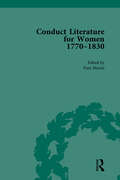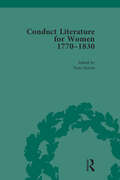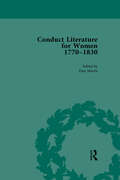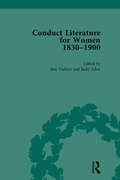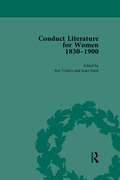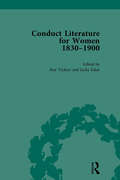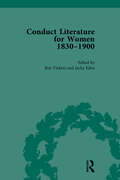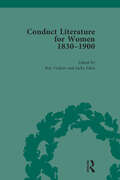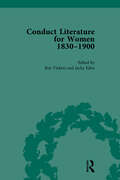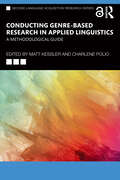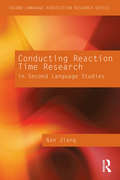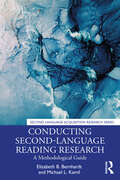- Table View
- List View
Conduct Literature for Women, Part II, 1640-1710 vol 4
by William St Clair Irmgard MaassenThis collection aims to give a chronological insight into the evolution of conduct literature, from its early roots in the Renaissance period through to the dramatically different role that women played at the emergence of the 20th century.
Conduct Literature for Women, Part II, 1640-1710 vol 5
by William St Clair Irmgard MaassenThis collection aims to give a chronological insight into the evolution of conduct literature, from its early roots in the Renaissance period through to the dramatically different role that women played at the emergence of the 20th century.
Conduct Literature for Women, Part II, 1640-1710 vol 6
by William St Clair Irmgard MaassenThis collection aims to give a chronological insight into the evolution of conduct literature, from its early roots in the Renaissance period through to the dramatically different role that women played at the emergence of the 20th century.
Conduct Literature for Women, Part III, 1720-1770 vol 1
by Pam MorrisThe material presented in this six-volume set moves away from courtly etiquette, adopting a more middle-class, domestic focus, and includes facsimile reproductions of sermons, poems, narratives and cookery books.
Conduct Literature for Women, Part III, 1720-1770 vol 2
by Pam MorrisThe material presented in this six-volume set moves away from courtly etiquette, adopting a more middle-class, domestic focus, and includes facsimile reproductions of sermons, poems, narratives and cookery books.
Conduct Literature for Women, Part III, 1720-1770 vol 3
by Pam MorrisThe material presented in this six-volume set moves away from courtly etiquette, adopting a more middle-class, domestic focus, and includes facsimile reproductions of sermons, poems, narratives and cookery books.
Conduct Literature for Women, Part III, 1720-1770 vol 4
by Pam MorrisThe material presented in this six-volume set moves away from courtly etiquette, adopting a more middle-class, domestic focus, and includes facsimile reproductions of sermons, poems, narratives and cookery books.
Conduct Literature for Women, Part III, 1720-1770 vol 5
by Pam MorrisThe material presented in this six-volume set moves away from courtly etiquette, adopting a more middle-class, domestic focus, and includes facsimile reproductions of sermons, poems, narratives and cookery books.
Conduct Literature for Women, Part III, 1720-1770 vol 6
by Pam MorrisThe material presented in this six-volume set moves away from courtly etiquette, adopting a more middle-class, domestic focus, and includes facsimile reproductions of sermons, poems, narratives and cookery books.
Conduct Literature for Women, Part IV, 1770-1830 vol 1
by Pam MorrisThis collection aims to give a chronological insight into the evolution of conduct literature, from its early roots in the Renaissance period through to the dramatically different role that women played at the emergence of the 20th century. The material presented in this six-volume set moves away from courtly etiquette, adopting a more middle-class, domestic focus, and includes facsimile reproductions of sermons, poems, narratives and cookery books.Social and literary historians recognise the 1790s as a moment of political crisis and turbulence in British history: the intense reactions in Britain to increasing revolutionary violence in France politicised almost every aspect of cultural life. At the centre of discursive hostilities was the opposition between sentimentality, on the one hand, and rationality, on the other. Two of the most important literary forms utilised for expressing these polemics were novels and treatises on education, as well as conduct writing. Conduct Literature for Women IV, 1770-1830 makes available this body of writing, which has been less well studied in respect to the war of ideas than the former two.
Conduct Literature for Women, Part IV, 1770-1830 vol 2
by Pam MorrisThis collection aims to give a chronological insight into the evolution of conduct literature, from its early roots in the Renaissance period through to the dramatically different role that women played at the emergence of the 20th century. The material presented in this six-volume set moves away from courtly etiquette, adopting a more middle-class, domestic focus, and includes facsimile reproductions of sermons, poems, narratives and cookery books.Social and literary historians recognise the 1790s as a moment of political crisis and turbulence in British history: the intense reactions in Britain to increasing revolutionary violence in France politicised almost every aspect of cultural life. At the centre of discursive hostilities was the opposition between sentimentality, on the one hand, and rationality, on the other. Two of the most important literary forms utilised for expressing these polemics were novels and treatises on education, as well as conduct writing. Conduct Literature for Women IV, 1770-1830 makes available this body of writing, which has been less well studied in respect to the war of ideas than the former two.
Conduct Literature for Women, Part IV, 1770-1830 vol 3
by Pam MorrisThis collection aims to give a chronological insight into the evolution of conduct literature, from its early roots in the Renaissance period through to the dramatically different role that women played at the emergence of the 20th century. The material presented in this six-volume set moves away from courtly etiquette, adopting a more middle-class, domestic focus, and includes facsimile reproductions of sermons, poems, narratives and cookery books.Social and literary historians recognise the 1790s as a moment of political crisis and turbulence in British history: the intense reactions in Britain to increasing revolutionary violence in France politicised almost every aspect of cultural life. At the centre of discursive hostilities was the opposition between sentimentality, on the one hand, and rationality, on the other. Two of the most important literary forms utilised for expressing these polemics were novels and treatises on education, as well as conduct writing. Conduct Literature for Women IV, 1770-1830 makes available this body of writing, which has been less well studied in respect to the war of ideas than the former two.
Conduct Literature for Women, Part IV, 1770-1830 vol 4
by Pam MorrisThis collection aims to give a chronological insight into the evolution of conduct literature, from its early roots in the Renaissance period through to the dramatically different role that women played at the emergence of the 20th century. The material presented in this six-volume set moves away from courtly etiquette, adopting a more middle-class, domestic focus, and includes facsimile reproductions of sermons, poems, narratives and cookery books.Social and literary historians recognise the 1790s as a moment of political crisis and turbulence in British history: the intense reactions in Britain to increasing revolutionary violence in France politicised almost every aspect of cultural life. At the centre of discursive hostilities was the opposition between sentimentality, on the one hand, and rationality, on the other. Two of the most important literary forms utilised for expressing these polemics were novels and treatises on education, as well as conduct writing. Conduct Literature for Women IV, 1770-1830 makes available this body of writing, which has been less well studied in respect to the war of ideas than the former two.
Conduct Literature for Women, Part IV, 1770-1830 vol 5
by Pam MorrisThis collection aims to give a chronological insight into the evolution of conduct literature, from its early roots in the Renaissance period through to the dramatically different role that women played at the emergence of the 20th century. The material presented in this six-volume set moves away from courtly etiquette, adopting a more middle-class, domestic focus, and includes facsimile reproductions of sermons, poems, narratives and cookery books.Social and literary historians recognise the 1790s as a moment of political crisis and turbulence in British history: the intense reactions in Britain to increasing revolutionary violence in France politicised almost every aspect of cultural life. At the centre of discursive hostilities was the opposition between sentimentality, on the one hand, and rationality, on the other. Two of the most important literary forms utilised for expressing these polemics were novels and treatises on education, as well as conduct writing. Conduct Literature for Women IV, 1770-1830 makes available this body of writing, which has been less well studied in respect to the war of ideas than the former two.
Conduct Literature for Women, Part IV, 1770-1830 vol 6
by Pam MorrisThis collection aims to give a chronological insight into the evolution of conduct literature, from its early roots in the Renaissance period through to the dramatically different role that women played at the emergence of the 20th century. The material presented in this six-volume set moves away from courtly etiquette, adopting a more middle-class, domestic focus, and includes facsimile reproductions of sermons, poems, narratives and cookery books.Social and literary historians recognise the 1790s as a moment of political crisis and turbulence in British history: the intense reactions in Britain to increasing revolutionary violence in France politicised almost every aspect of cultural life. At the centre of discursive hostilities was the opposition between sentimentality, on the one hand, and rationality, on the other. Two of the most important literary forms utilised for expressing these polemics were novels and treatises on education, as well as conduct writing. Conduct Literature for Women IV, 1770-1830 makes available this body of writing, which has been less well studied in respect to the war of ideas than the former two.
Conduct Literature for Women, Part V, 1830-1900 vol 1
by Pam Morris Roy Vickers Jacky EdenCovers the Victorian period, bringing together a range of texts reflecting the role of women in an era when their cultural influence broadened as science, religious doubt, and the idea of the nation evolved as systems of cultural representation.
Conduct Literature for Women, Part V, 1830-1900 vol 2
by Pam Morris Roy Vickers Jacky EdenCovers the Victorian period, bringing together a range of texts reflecting the role of women in an era when their cultural influence broadened as science, religious doubt, and the idea of the nation evolved as systems of cultural representation.
Conduct Literature for Women, Part V, 1830-1900 vol 3
by Pam Morris Roy Vickers Jacky EdenCovers the Victorian period, bringing together a range of texts reflecting the role of women in an era when their cultural influence broadened as science, religious doubt, and the idea of the nation evolved as systems of cultural representation.
Conduct Literature for Women, Part V, 1830-1900 vol 4
by Pam Morris Roy Vickers Jacky EdenCovers the Victorian period, bringing together a range of texts reflecting the role of women in an era when their cultural influence broadened as science, religious doubt, and the idea of the nation evolved as systems of cultural representation.
Conduct Literature for Women, Part V, 1830-1900 vol 5
by Pam Morris Roy Vickers Jacky EdenCovers the Victorian period, bringing together a range of texts reflecting the role of women in an era when their cultural influence broadened as science, religious doubt, and the idea of the nation evolved as systems of cultural representation.
Conduct Literature for Women, Part V, 1830-1900 vol 6
by Pam Morris Roy Vickers Jacky EdenCovers the Victorian period, bringing together a range of texts reflecting the role of women in an era when their cultural influence broadened as science, religious doubt, and the idea of the nation evolved as systems of cultural representation.
Conducting Genre-Based Research in Applied Linguistics: A Methodological Guide (ISSN)
by Matt Kessler and Charlene PolioThis collection is a comprehensive resource on conducting research in applied linguistics involving written genres that is distinctive in its coverage of a multiplicity of interdisciplinary perspectives.The volume explores the central approaches, methodologies, analyses, and tools used in conducting genre-based research, extending the traditional focus on a single framework for defining genres by explicating the major approaches that have been invoked in applied linguistics. Chapters address a mix of commonly used methodologies (e.g., case studies, ethnographic approaches), types of analyses (e.g., metadiscourse, rhetorical move-step analysis, multidimensional analysis, lexical bundles and phrase frames, CALF measures, multimodal analysis), and studies that focus on other areas of second language (L2) teaching and learning (e.g., multilingualism, the Teaching and Learning Cycle). Taken together, the volume provides a theoretically and methodologically diverse introduction to foundational topics in genre-related research, supported by detailed discussions of the challenges and practical considerations to take into account when conducting research involving written genres.This book is a valuable resource for graduate students, faculty, and researchers in applied linguistics, particularly those working in second language acquisition, L2 writing, and genre theory and pedagogy.Chapter 2 of this book is freely available as a downloadable Open Access PDF at http://www.taylorfrancis.com under a Creative Commons Attribution-Non Commercial-No Derivatives (CC-BY-NC-ND) 4.0 license.
Conducting Genre-Based Research in Applied Linguistics: A Methodological Guide (Second Language Acquisition Research Series)
by Matt Kessler and Charlene PolioThis collection is a comprehensive resource on conducting research in applied linguistics involving written genres that is distinctive in its coverage of a multiplicity of interdisciplinary perspectives. The volume explores the central approaches, methodologies, analyses, and tools used in conducting genre-based research, extending the traditional focus on a single framework for defining genres by explicating the major approaches that have been invoked in applied linguistics. Chapters address a mix of commonly used methodologies (e.g., case studies, ethnographic approaches), types of analyses (e.g., metadiscourse, rhetorical move-step analysis, multidimensional analysis, lexical bundles and phrase frames, CALF measures, multimodal analysis), and studies that focus on other areas of second language (L2) teaching and learning (e.g., multilingualism, the Teaching and Learning Cycle). Taken together, the volume provides a theoretically and methodologically diverse introduction to foundational topics in genre-related research, supported by detailed discussions of the challenges and practical considerations to take into account when conducting research involving written genres. This book is a valuable resource for graduate students, faculty, and researchers in applied linguistics, particularly those working in second language acquisition, L2 writing, and genre theory and pedagogy.
Conducting Reaction Time Research in Second Language Studies (Second Language Acquisition Research Series)
by Nan JiangThis book offers a general introduction to reaction time research as relevant to Second Language Studies and explores a collection of tasks and paradigms that are often used in such research. It provides a lucid explanation of the technical aspects of collecting reaction time data and outlines crucial research principles and concepts that will ensure accurate data. In addition, Conducting Reaction Time Research in Second Language Studies provides step-by-step instructions for using DMDX, a software program widely used for conducting reaction time research. From general guidelines to techniques to working with data, this complete "why and how" guide for conducting reaction time research is ideal for both students/beginners and more seasoned researchers.
Conducting Second-Language Reading Research: A Methodological Guide (ISSN)
by Elizabeth B. Bernhardt Michael L. KamilThis is the first hands-on methods guide for second-language (L2) reading research. The authors expertly and critically situate L2 reading and literacy as a multivariate, interactive process and define terms, concepts, and research tools in connection with theory and a rich body of past empirical work, with lessons to learn and pitfalls to avoid. They concretely detail how to design empirical studies, collect data, and analyze findings in this important area.Authored by world experts on first-language (L1) and L2 reading, this book provides a comprehensive, critical, theory-driven review of methods in L2 reading research, offering a step-by-step guide from research design to study execution and data analysis.With useful pedagogical features and a unique database of L2 reading studies from around the world over three decades, this will be an invaluable resource to students and researchers of second-language acquisition, applied linguistics, education, and related areas.
